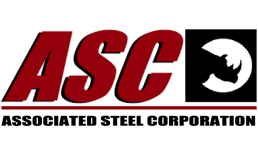We have talked about round bar grinding in the past. The following posts will look deeper into the communicating skills that will help you minimize disappointments in this area. Unfortunately, more people than not have purchased a bar of steel and found that it won’t make their part because there was not sufficient stock allowance to “clean-up”. That need not be the case. Most often, communication is again the culprit. We are speaking of ROUND STEEL BARS.
- Diameter size relative to length will be important.
- Subsequent machining or grinding method will be important.
- Mill finish and mill tolerance will be important. This often varies by mill.
- You should share “end use” with your supplier.
- Also, share any subsequent operations you will be doing on the bar.
- If the finished shaft involves substantial step downs, or, if only a small portion of the bar needs to finish…share that information.
- Remember, your supplier cannot be made responsible for a third party’s work, and/or, mistakes.
- If liability on the shaft is considerable, consider parking it in another party’s driveway.
- Try to “Talk the Talk” phrases like, “a stick of steel”, or, “cold roll”, or, “a length of steel”, will get you in trouble.
- Share important ancillary facts with your supplier; have you received steel in the past that has not been straight enough, hasn’t cleaned up, or was inappropriate in another way?
Each one of the above should solicit further discussion. That is going to come under the header of; TO BE DISCUSSED (TBD). I will try to do just that over the next several weeks. So, stay tuned.
-Howard Thomas, February 26th 2019
User Friendly or Extended Service? Choose
Metals and various heavy industrial maintenance materials are basically dumb. There is no consciousness on their part that knows bad heat from intentional thermal processing. It’s all just heat. There is no discernment of difference between machining, grinding, and in-service abrasive wear. Remember that when you are reviewing specs on a new material that has the incredible ability to resist wear in the application, but it is listed as “Free-Machining”. Think about it a bit. If the steel can’t tell good wear from bad wear, or good heat from bad heat, how can that be? What an intelligent piece of steel! It knows exactly what you want and when you want it.
What about a dead hard piece of steel that has been flash tempered to 500bhn at 300F. We are not talking about a high grade rich chemistry tool steel here. More like a good quality 500bhn wear plate. Good quality from a fine mill. How is that going to work in a service temperature that gets up to 500F? What is going to happen to the hardness when you torch cut it or weld it?
These are the differences between “production steels”, and critical service maintenance replacement steels. If you want it to machine easily, you are not interested in the piece lasting a long time in abrasive service. If the steel requires rapid cooling and a low temperature temper to achieve hardness, know that even a very low temperature will begin to soften the material. You can’t have it both ways.
If you are working in customer service for a steel service center, or, if you are requisitioning materials for replacement parts. Remember that steels are dumb. If you want a high speed rotating or reciprocating shaft to last a long time in a very contaminated environment, with lots of particulate matter in the atmosphere, be willing to exercise some precautions and learn how to machine hardened steels like a pro.
Don’t opt for a “Free-Machining” shaft because that is not going to last long in service. Also, if it is Free-Machining, has sulfur been added to obtain that property? If it has, and you are contemplating any welding, be careful. Welding does not like sulfur.
Welding Dead Hard (500bhn) steel strips into place will require familiarity with some cautions and restrictions if you want them to remain hard in service.
Successful processing and installation of the right product for the application will most likely require some experience and talent. Getting material that is the easiest to machine and weld will probably insure poor service life.
-Howard Thomas, January 3rd 2019
Click here to add your own text
Associated Steel Corporation reserves the right to delete comments that contain vulgar language, personal attacks of any kind, or offensive comments that target or disparage any ethnic, racial, or religious group. Further Associated Steel Corporation also reserves the right to delete comments that are: spam, advocates illegal or unethical activity and infringes on copyrights or trademarks.
Click here to add your own text
Howard Thomas
Experience
Sr. Acct. Mgr. (US Southwest) / Metallurgical Consultant
Associated Steel Corporation
Jan 2017 – Present
Past Vice President / General Manager
Associated Steel Corporation
Apr 1998 – Jan 2017
Past Vice President / General Manager
Baldwin International
Apr 1974 – Mar 1997
Education
Cleveland State University
Kent State University
University of Denver

